Texas State announces new Coverdell Fellows partnership with Peace Corps
Jayme Blaschke | October 8, 2020

Texas State University has joined with the Peace Corps as one of six new university partnerships in the Paul D. Coverdell Fellows Program.
This comes as the Peace Corps celebrates the 35th anniversary of the Coverdell Fellows, a graduate fellowship program that offers financial assistance to returned volunteers. All fellows complete internships in underserved communities in the United States, allowing them to bring home and expand upon the skills they learned as volunteers abroad. These skills in adapting to new cultures, developing and managing projects, dealing with language barriers and leveraging limited resources attract the attention of prospective schools.
Coverdell Fellows in the new partnership will enter the Master of Social Work program at Texas State. The MSW prepares students to serve as effective and ethical leaders for change in a diverse and dynamic society. It advances the purpose of social work, which is to promote personal and organizational well-being and to build a more just society. A similar Coverdell Fellows partnership with International Studies at Texas State is now in its third year.
"Having students in the MSW program who bring maturity, life experience and a broader worldview as a result of their Peace Corp experience, is very important for not only their academic success, but also contributes to the overall educational experience of other graduate students," said Angela Ausbrooks, director of the School of Social Work.
The Advanced Practice Leadership curriculum at Texas State allows students to integrate direct services and administrative course work in order to pursue agency-based practice in the public sector, serving society’s most vulnerable clients. Program options include on-campus, online and regular or advanced standing.
"A broader worldview also supports students’ ability to engage in critical thinking and analyses and examine social justice issues from a more in-depth level and global perspective," said Andrea Golato, dean of Texas State's Graduate College.
"Thirty-five years and more than 5,000 participants later, Coverdell Fellows programs at schools across the country continue to provide returned volunteers affordable access to graduate education, while also creating amazing opportunities to apply the knowledge and skills they’ve garnered during service toward improving local communities," said Peace Corps Director Jody Olsen. "These are incredibly meaningful avenues for returned volunteers to continue serving in the spirit of the Peace Corps."
Established in 1985, the first fellows program was at Teachers College, Columbia University. The Peace Corps now partners with more than 120 institutions of higher education across the country in 37 states. The partnership covers more than 200 programs at these universities, offering returned Peace Corps volunteers more than 300 graduate and post-graduate degrees.
"I am delighted to see Coverdell Fellows reach its 35th anniversary," said La’Teashia Sykes, Peace Corps director of university programs. "This program encourages an invaluable exchange between returned Peace Corps volunteers, educational institutions and local communities. We look forward to the next 35 years facilitating affordable graduate education for returned volunteers, adding a global perspective to classroom discussions and supporting underserved U.S. communities."
To see a current list of all Paul D. Coverdell Fellows programs around the country, including degrees and financial assistance offered, as well as university contacts, visit: www.peacecorps.gov/universityprograms.
About the Peace Corps
The Peace Corps sends Americans with a passion for service abroad on behalf of the United States to work with communities and create lasting change. Volunteers develop sustainable solutions to address challenges in education, health, community economic development, agriculture, environment and youth development. Through their Peace Corps experience, volunteers gain a unique cultural understanding and a life-long commitment to service that positions them to succeed in today's global economy. Since President John F. Kennedy established the Peace Corps in 1961, more than 240,000 Americans of all ages have served in 142 countries worldwide. For more information, visit peacecorps.gov and follow us on Facebook, Instagram and Twitter.
Share this article
For more information, contact University Communications:Jayme Blaschke, 512-245-2555 Sandy Pantlik, 512-245-2922 |